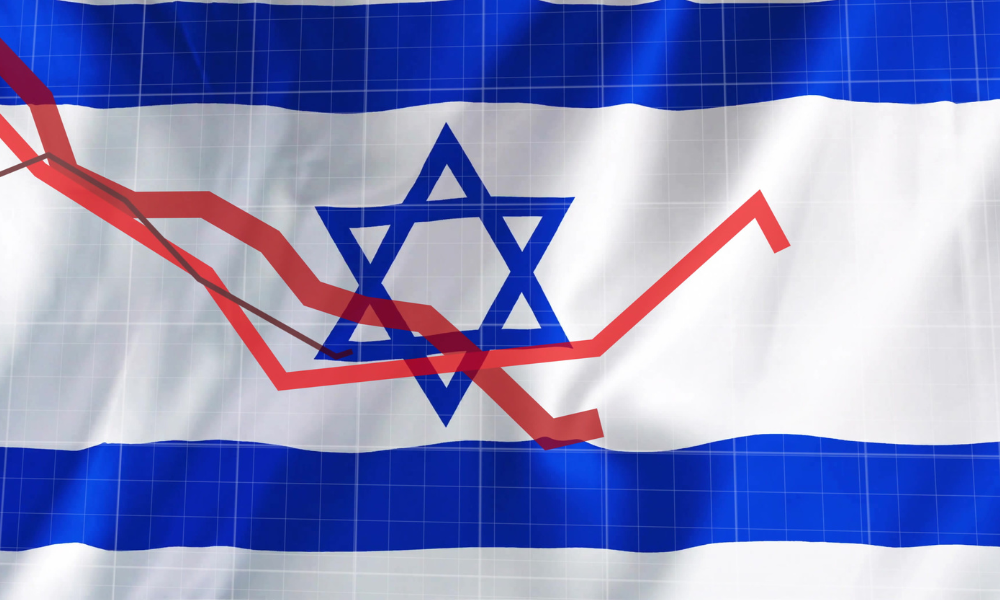

by Anand Krishnamoorthy and Julien Ponthus
Crude oil jumped the most in more than three years, stocks slid and haven assets including government bonds and gold rose after Israel attacked Iran’s nuclear program sites in a major escalation of tensions in the Middle East.
Oil surged as much as 13%, the biggest intraday jump since March 2022, before paring gains. Contracts for the S&P 500 index retreated 1.3%. European equities fell 1.1% and Asian stocks dropped the most in two months. Gold rose 0.7% and Treasuries advanced, with the 10-year yield falling two basis points to 4.34%.
The dollar rebounded from Thursday’s three-year low, rising 0.3% as the greenback was buoyed by a shift toward safer currencies.
“We brace for a volatile day, we’ll probably be closing in the red,” said Vincent Juvyns, chief investment strategist at ING. “Typical safe havens should rise, like the dollar, treasuries and gold.”
The airstrikes against Iran’s nuclear program and ballistic-missile sites renewed a standoff between the two adversaries that risks spiraling into a wider conflict. While the market reaction was strongest in crude oil, moves in other pockets of the market suggested that investors are watching how long the tensions will last and whether the situation escalates.
“We are seeing classical risk-off moves,” said Matthew Haupt, portfolio manager at Wilson Asset Management. “What we are watching now for is the speed and scale of the response from Tehran. That will shape the duration of the current moves. Quite often these moves fade after the initial shocks.”
Israel said the operation will continue for “as many days” as it takes to remove the threat and Iran vowed to respond “harshly.” Israel Defense Forces says Iran launched more than 100 drones toward Israel in the last few hours.
The move came after repeated warnings by Israeli Prime Minister Benjamin Netanyahu about striking Iran and crippling its nuclear program. Iran had previously said it would inaugurate a new uranium-enrichment facility in response to censure by the UN atomic watchdog over its nuclear program.
The Israeli currency fell as much as 3.4% against the dollar to its weakest level since April. The oil futures curve strengthened on concerns that Israel’s latest strike on Iran could have severe and long-lasting repercussions.
The attack is coming at a time when global financial markets had recovered from a slump in April caused by Trump’s tariffs. An index of global stocks touched a record Thursday, gaining more than 20% from a low hit in April.
“Short term it will be used as an excuse or a catalyst by investors for some profit taking after a very strong come-back of risk assets,” said Vincent Mortier, chief investment officer at Amundi SA. “Price reaction of historical safe havens has been minimal. We believe the events of last night will remain localized and will not degenerate into something more global.”
Stocks
Currencies
Cryptocurrencies
Bonds
Commodities
This story was produced with the assistance of Bloomberg Automation.
Copyright Bloomberg News

A new proposal could end the ban on promoting client reviews in states like California and Connecticut, giving state-registered advisors a level playing field with their SEC-registered peers.

Morningstar research data show improved retirement trajectories for self-directors and allocators placed in managed accounts.

Some in the industry say that more UBS financial advisors this year will be heading for the exits.

The Wall Street giant has blasted data middlemen as digital freeloaders, but tech firms and consumer advocates are pushing back.

Research reveals a 4% year-on-year increase in expenses that one in five Americans, including one-quarter of Gen Xers, say they have not planned for.
Orion's Tom Wilson on delivering coordinated, high-touch service in a world where returns alone no longer set you apart.
Barely a decade old, registered index-linked annuities have quickly surged in popularity, thanks to their unique blend of protection and growth potential—an appealing option for investors looking to chart a steadier course through today's choppy market waters, says Myles Lambert, Brighthouse Financial.
